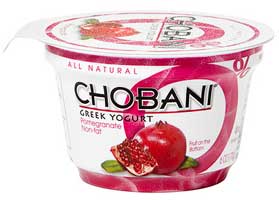Top Class Actions’s website and social media posts use affiliate links. If you make a purchase using such links, we may receive a commission, but it will not result in any additional charges to you. Please review our Affiliate Link Disclosure for more information.

The Chobani class action lawsuit was dismissed with prejudice by U.S. District Judge Lucy Koh on Feb. 20 in response to Chobani’s request for dismissal in the case, brought against the company by three plaintiffs: Katie Kane, Arianna Rosales and Darla Booth. Koh had dismissed the Chobani class action lawsuit previously, but left leave for the class action to be amended. This was the third time that the plaintiffs tried to bring a successful complaint against the company.
The plaintiffs sued Chobani in 2012 for calling the sweetener in its Greek yogurt products “evaporated cane juice” on its labels when in fact, they allege, it is just sugar. They claimed that the term “evaporated cane juice” is false and misleading, and that it is a violation of regulations set forth by the U.S. Food & Drug Administration, which say that ingredients must be called by “common and usual names.”
“Plaintiffs’ allegations in the [third amended complaint] continue to suggest that plaintiffs understand that dried cane syrup was a form of sugar because plaintiffs repeatedly refer to sugar and dried cane syrup interchangeably throughout the [third amended complaint],” Koh wrote in her dismissal order.
Because of that Koh, said the plaintiffs didn’t explain how they knew dried cane syrup was sugar, but not evaporated cane juice.
The judge also didn’t buy their argument that they thought the word “juice” in evaporated cane juice made them think it was “healthier than sugar.”
“However, the [third amended complaint] undermines plaintiffs allegation. The [third amended complaint] repeatedly acknowledges that ‘fruit juice concentrate’ is a well-known added sugar,” Koh said.
The plaintiffs also claimed that Chobani has falsely labeled its Greek yogurts as “all natural” and stated that they contain “only natural ingredients” when they do include artificial colors.
The judge also said that there was no evidence for the assertion that the tumeric and and fruit and vegetable juice concentrates used for adding color were more similar to “coal tar dyes” than what thy were derived actually from.
“Simply put, plaintiffs do not allege how they thought these juices were processed, nor provide any explanation as to how defendant ‘highly processed’ the juices in such a way to render them unnatural,’ or how the processing fell short of defendant’s labeling representations,” Koh argued.
They said that they read the Chobani labels before purchasing the Chobani Greek yogurt products and took the claims and ingredients listed to mean that the yogurts only contained sugars that were naturally derived from milk and fruit but that they were not sweetened by added sugar. And, they add, that had they known that they contained added sugar, they would not have bought the yogurt.
The class action lawsuit concerned the pomegranate, lemon, peach, vanilla, strawberry and blueberry flavors of Chobani Greek yogurt as well as the Chobani Greek Yogurt Champions, even though the plaintiffs did not purchase the “champions” yogurt.
For these reasons, Koh dismissed the allegations that Chobani violated California’s Unfair Competition Law because the plaintiffs did not show that they used what they say was fraudulently misrepresented in their decision to purchase the project. California’s False Advertising Law and Consumers Legal Remedies Act were dismissed for the same reason.
The plaintiffs are represented by Darren Brown of Provost Umphrey law Firm LLP and Pierce Gore of Pratt & Associates.
The Chobani Greek Yogurt Class Action Lawsuit is Kane, et al. v. Chobani Inc., Case No. 5:12-cv-02425, in the U.S. District Court for the Northern District of California.
UPDATE: On Mar. 16, 2016, after their Chobani class action lawsuit was dismissed, three plaintiffs took their claim to the Ninth Circuit to attempt to revive allegations that the yogurt-maker deceives consumers by mislabeling ingredients.
ATTORNEY ADVERTISING
Top Class Actions is a Proud Member of the American Bar Association
LEGAL INFORMATION IS NOT LEGAL ADVICE
Top Class Actions Legal Statement
©2008 – 2024 Top Class Actions® LLC
Various Trademarks held by their respective owners
This website is not intended for viewing or usage by European Union citizens.















3 thoughts onChobani Greek Yogurt Class Action Lawsuit Gets the Axe
UPDATE: On Mar. 16, 2016, after their Chobani class action lawsuit was dismissed, three plaintiffs took their claim to the Ninth Circuit to attempt to revive allegations that the yogurt-maker deceives consumers by mislabeling ingredients.
Why have you not had any coverage of the class action lawsuit against front loader washing machines for moldy/musty odor?
Sorry – just saw it on the home page.